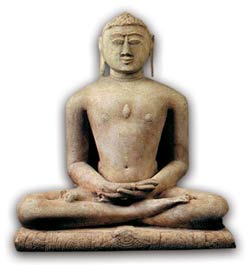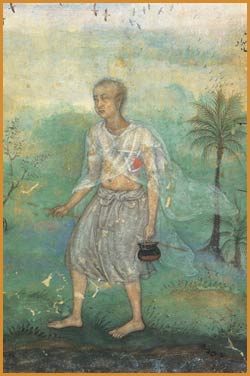When discussing Far Eastern religions, one cannot help but think of paganism. In the first part of the book we examined Hinduism, by far the oldest and with more adherents than any other eastern religion. It is possible to see evidences of the superstitious Hindu religion in the western world, and many other cultures bear some of its signs as well. The period of British colonial rule in India played a key role in its spread in the west. However, there are many other perverse beliefs in the east, like Jainism, Buddhism, Sikhism, Shintoism, Confucianism and Taoism. These superstitious religions are subdivided within themselves into different sects and vary from country to country.
 The most striking feature of the superstitious Far Eastern religions is there denial of Allah’s absolute existence based on paganism. Each has its own false gods and idols to which they bow down. Their adherents regard their stone idols as higher than anything else on earth, and spend their lives serving them, unaware of the utter ignorance they are in. They idolize their ancestors, cows, monkeys, mice or even trees in their terribly ignorant state. Allah reveals the situation of such people in Surah Fatir as follows:
The most striking feature of the superstitious Far Eastern religions is there denial of Allah’s absolute existence based on paganism. Each has its own false gods and idols to which they bow down. Their adherents regard their stone idols as higher than anything else on earth, and spend their lives serving them, unaware of the utter ignorance they are in. They idolize their ancestors, cows, monkeys, mice or even trees in their terribly ignorant state. Allah reveals the situation of such people in Surah Fatir as follows:
If you call on them they will not hear your call, and were they to hear, they would not respond to you. On the Day of Resurrection they will reject your making associates of them. No one can inform you like One Who is All-aware. (Surah Fatir: 14)
This chapter will examine the flaws inherent in these superstitious religions and remind their followers of the existence of erroneous practices in their lives. They will also be called on to abandon these perverse beliefs and to submit to Allah.
Another subject that will be looked at is the fact of certain circles’ propaganda efforts in the present era to disseminate these false religions, portrayed as the supposed path to salvation.
These false religions have been created by materialist / atheist circles in order to eradicate religious morality’s positive and beautiful influence on society, and to mislead people in search of “spirituality” with beliefs opposing faith in Allah. It is the duty of believers to warn people of the dangers of these movements. Our Lord says:
Say: “Who is the Lord of the heavens and the earth?” Say: “Allah.” Say: “So why have you taken protectors apart from Him who possess no power to help or harm themselves?” Say: “Are the blind and seeing equal? Or are darkness and light the same? Or have they assigned partners to Allah Who create as He creates, so that all creating seems the same to them?” Say: “Allah is the Creator of everything. He is the One, the All-Conquering.” (Surat ar-Ra‘d: 16)
The oppressive social order extant in the superstitious Hindu religion which privileges the upper castes whilst enslaving the lower ones, the cruelty it inflicts on women, and the pervert ritual sacrifices to idols have caused great concern to some Hindus throughout their history. Many new regional religious movements that rejected the more oppressive aspects of Hinduism emerged as a consequence and they introduced new practices and teachings in their stead. Siddhartha Gautama founded Buddhism in the 6th century BC. It emerged from Hinduism but with some major differences. Gautama utterly rejected the caste system but introduced asceticism and preserved the false doctrines of karma and reincarnation. (See: Islam and Buddhism, Harun Yahya, Published by Abdul Naeem for Islamic Book Service)
Jainism is another religion that emerged around the same time with striking similarities to Buddhism.
Jainism is a superstitious movement that rejects the caste system which divides society into different classes and forms a major part of Hindu doctrine but has its own erroneous and pagan beliefs. It is not possible to ascertain with any accuracy the period in which Jainism’s traditions emerged, but research reveals that it is an ancient religion that became established in India around 500 BC. All of Jainism’s principles of belief were amalgamated at this time by Nataputta Vardhamana or Mahavira, a man belonging to the warrior caste. He formulated this new superstitious religion, founded its own temples, initiated male and female monks and encouraged asceticism. Jainism is considered to be one of the oldest superstitious beliefs in India and has a worldwide following of approximately four million people.

Jains make offerings to their idols of fresh coconuts, bananas and various other fruits, while condemning themselves to hunger and poverty. Jainism claims to be the elimination of all of a person’s desires, but is actually a system of oppression.
One of the most significant aspects of Jainism is its rejection of Almighty Allah. It is atheistic. Jainism suggests that the universe is eternal and that existence has neither a beginning nor end, on the basis of no rational or scientific evidence whatsoever. According to their mistaken way of thinking, every being and all things are eternal, too, and the universe merely functions by its own supposed cosmic laws. This definition also forms the basis of all materialistic teachings, and has been put forward by irreligious societies ever since the most ancient times. In the 20th century this materialistic interpretation has been disproved by science. The Big Bang theory exposed the idea of an eternal universe as wrong and proved that the universe was created from nothingness.
The Big Bang theory revealed that the universe was born fifteen billion years ago in an enormous explosion. All matter existing in the universe was non existent before. That the universe was consciously shaped in each of its phases is another fact revealed by the Big Bang theory. Even without the knowledge of these scientific facts, Allah’s infinite power and might is easily recognizable. The flawless order of the universe, the unique structures in animal life and nature, and the perfection of the human body and many other factors form the evidence for Allah’s superior power of creation. Allah is All-present and All-encompassing; all beings are in submission to Him. Our infinitely powerful Lord has created the entire universe in which we live, all people who have ever existed on the face of the earth and everything else out of nothing. Allah says:
Does not man see that We created him from a drop yet there he is, an open antagonist! He makes likenesses of Us and forgets his own creation, saying, “Who will give life to bones when they are decayed?” Say “He Who made them in the first place will bring them back to life. He has total knowledge of each created thing; He Who produces fire for you from green trees so that you use them to light your fires.” Does He Who created the heavens and earth not have the power to create the same again? Yes indeed! He is the Creator, the All-Knowing. His command when He desires a thing is just to say to it, “Be!” and it is. Glory be to Him Who has the Dominion of all things in His Hand. To Him you will be returned. (Surah Ya Sin: 77-83)

The so-called deities the Mahavira occupy an important place in perverted Jainist rituals.
Jainism is an atheistic religion that still contains many idolatrous beliefs originating in Hinduism. Temples of this faith, or its shrines in people’s homes contain many of the imaginary deities of Hinduism in the form of idols or pictures. When Jains pay their respects to these idols they offer them food, flowers and incense. People irrationally pray to them for a long life, wealth or male children in the hope that they will help them without ever pondering that these idols cannot hear them, see them or answer their prayers. Allah describes the situation of such people who worship stone or wooden idols as follows:
After he left, Moses’s people took the Calf (for worship) made from their ornaments, a form which made a lowing sound. Did they not see that it could not speak to them or guide them to any way? They adopted it and so they were wrongdoers. (Surat al-A‘raf: 148)
Could they not see that it did not reply to them and that it possessed no power to either harm or benefit them? (Surah Ta Ha: 89)
Do they have legs they can walk with? Do they have hands they can grasp with? Do they have eyes they can see with? Do they have ears they can hear with? Say: “Call on your partner-gods and try all your wiles against me and grant me no reprieve.” (Surat al-A‘raf: 195)

Say: Call on those you make claims for besides Allah. They have no power over even the smallest particle, either in the heavens or in the earth. (Surah Saba’: 22)
Jainism rejects the existence of Allah but prescribes perverse beliefs in other deities such as the perfect man. However, to attain this perfection, a man must go through a lengthy education process, he must diligently practice all the required rituals, must inflict sufferings on himself, exist for years in absolute destitution or even commit suicide if necessary. According to the false beliefs of Jainism, a person who succeeds in all this will break the imaginary cycle of life and death, free his soul and attain a higher state of being. (The word Jain comes from the word Jina, meaning conquest. The word Jina is used in the sense of a conquest of the spiritual world.)
In Jainism, a person who attains this state is termed to be a Tirhankara, a deity (surely Allah is beyond that). The aim of millions of Jains, who regard this superstitious faith as an absolute reality, is to attain that rank. It is believed that there have been 24 Tirhankaras thus far and that Mahavira, regarded as the founder of Jainism, was the 24th. Tirhankaras in the superstitious Jain religion are believed to be above everything else; the Jains revere them in rituals and seek help from them.
In reality, to regard a man as a deity (Allah forbid), to worship him or to pray to him is ascribing partners to Allah. As we have related in previous chapters, to associate partners with Allah or His attributes is a great sin which Allah says He will not forgive. Allah reveals the situation of people who acquire idols besides Him in the following verse:
But they have adopted gods apart from Him which do not create anything but are themselves created. They have no power to harm or help themselves. They have no power over death or life or resurrection. (Surat al-Furqan: 3)
Allah has created man from nothing and no man has either will nor power by Himself. Man speaks by Allah’s will and lives with the life He gives him. No human being has the power to move in the slightest way outside of his Allah-given destiny, and every man will die at the time and place determined by Allah without being able to move this appointed time forward or backward by so much as a second. For this reason it is a grave mistake and an act of ignorance to idolize man, who has been created on earth with weaknesses and desires. Allah reveals that He created man weak: ”... Man was created weak.” (Surat an-Nisa’: 28) The following are other verses pertaining to man’s nature:
O man! what has deluded you in respect of your Noble Lord? He Who created you and formed you and proportioned you and assembled you in whatever way He willed. Yes indeed! But still you deny the Judgment. (Surat al-Infitar: 6-9)
The purpose of man’s creation is revealed in the Surat adh-Dhariyat:
I only created jinn and man to worship Me. (Surat adh-Dhariyat: 56)
Therefore, the path suggested by Jains for the supposed salvation of the human soul is an extremely erroneous one. And it is most certainly not a means to happiness. In addition, it is a huge perversion to make claims about humans achieving divinity together with alleged salvation. The purpose of man is to serve his Lord and he can expect to win Allah’s good pleasure, mercy and paradise.

Jains believe that they can save their souls through superstitious practices, but in reality they are merely torturing themselves for nothing.
Like all other pagan Far Eastern religions, Jainism too adopts reincarnation and karma as principles of faith. It is the aim of Jainism to break the cycle of karma and to attain the state of a higher existence. According to this faith, the only way of reaching this goal is absolute adherence to its rules. Fasting, abstinence of certain foods, total control over desires, temptations and cravings, solitary retreat and enduring maximum suffering are some of these.
The fundamental principle in Jainism is “Ahimsa” which means “non-violence, not to cause pain and not to harm life”. It is the most important principle taught at Jainism’s schools and forms the guiding principle of its adherents. Ahimsa has influenced all schools of thought in India and forms part of all its religions.
Because of this principle Jains try not to cause harm to any living being. When this principle is first encountered it may well appear to be a very noble principle, but it has become a source of schizophrenia for Jains. As they believe that every living being has a soul, albeit at different levels, animals, insects, plants and even microscopic forms of life are all included in the Ahimsa principle. It goes without saying that it is practically impossible to live without harming or killing at least some small forms of life which die when we breathe, drink or eat. Moreover, there are many microscopic beings everywhere we sit and sleep or even on the clothes we wear. The Jains take irrational, illogical and nonsensical precautions in this regard. For instance, they wear masks over their mouths in order not to kill any small creatures and they do not take any medications to kill viruses; it is forbidden in the superstitious Jain religion to use antibiotics or disinfectants, or to eat honey, fruit or meat. The Catholic Encyclopaedia writes the following on Ahimsa:

While Jains live in hunger and poverty, they perversely offer all they have to idols made of stone.
“The Jain ascetic allows himself to be bitten by gnats and mosquitoes rather than risk their destruction by brushing them away. … for example, in 1834 there existed in Kutch a temple hospital which supported 5000 rats…”107
Jain priests have even stricter rules governing their everyday lives. For instance, they do not eat at night as they think they might swallow some small insect or other living being, and in some sects of Jainism they can only eat once a day. Most Jain priests do not wear any clothes, preferring instead to go about totally naked; others wear a tiny loincloth. The reason behind this nakedness is that they do not want to harm any creatures that might get in the creases of their garments. The Digambara sect, one of the oldest in Jainism, is particularly strict in this regard. The word means “heaven garment” and they wear no clothes at all. This means that they have to stay clear of all material things. These practices still continue and such Jains hardly ever leave their monasteries or temples. They cannot own property or marry. Jain monks believe that they should not even own clothing. This means that Jain priests’ lives are spent in absolute destitution and hunger. They refrain from anything that is entertaining, comforting, pleasant or pleasurable, because their belief dictates the destruction of all their desires, to severe all ties with this life in a schizophrenic manner and simply to live a sad life. Jains believe that the more they suffer and the more they live in hunger and destitution, the quicker they will “free their souls”. This however is not freedom, it is self inflicted torture. Such practices cannot free people but serve only to enslave them within an oppressive system. The claim that Jainism destroys all human desires is in reality a guise of a cruel and oppressive system.
Islam is wholly different to such superstitious beliefs. Allah has created the things in this life for people to benefit from them, to enjoy them and to be grateful for them. The beauty in nature, foods of different tastes and scents, fruits and vegetables are the gifts of Allah. A believer enjoys nice clothing or a tasty fruit and he is grateful to Allah for it. Allah reveals His gifts to mankind as follows:
And He created livestock. There is warmth for you in them, and various uses and some you eat. And there is beauty in them for you in the evening when you bring them home and in the morning when you drive them out to graze. They carry your loads to lands you would never reach except with great difficulty. Your Lord is All-Gentle, Most Merciful. And horses, mules and donkeys both to ride and for adornment. And He creates other things you do not know. The Way should lead to Allah, but there are those who deviate from it. If He had wished He could have guided every one of you. It is He Who sends down water from the sky. From it you drink and from it come the shrubs among which you graze your herds. And by it He makes crops grow for you and olives and dates and grapes and fruit of every kind. There is certainly a Sign in that for people who reflect. He has made night and day subservient to you, and the sun and moon and stars, all subject to His command. There are certainly Signs in that for people who use their intellect. And also the things of varying colors He has created for you in the earth. There is certainly a Sign in that for people who pay heed. It is He Who made the sea subservient to you so that you can eat fresh flesh from it and bring out from it ornaments to wear. And you see the ships cleaving through it so that you can seek His bounty, and so that hopefully you will show thanks. He cast firmly embedded mountains on the earth so it would not move under you, and rivers and pathways so that hopefully you would be guided, and landmarks. And they are guided by the stars. Is He Who creates like him who does not create? So will you not pay heed? If you tried to number Allah’s blessings, you could never count them. Allah is Ever-Forgiving, Most Merciful. (Surat an-Nahl: 5-18)
Allah has given countless things for people to make use of because He wants them benefit from them. Those who say that blessings made lawful by Allah are actually forbidden or, in other words, prevent people from enjoying them are on the wrong path. Allah reveals this fact:
Say: “Who has forbidden the fine clothing Allah has produced for His servants and the good kinds of provision?” Say: “On the Day of Resurrection such things will be exclusively for those who had faith during their life in the world.” In this way We make the Signs clear for people who know. (Surat al-A‘raf: 32)

According to the superstitious beliefs of Shinto, the souls of visitors to this rock shrine at Ise can be purified. However, like all other Shinto beliefs, this is false. It is only possible to cleanse the soul and attain salvation through sincere submission to Allah and living solely for His approval.
As this verse suggests, superstitious Jain belief forbids most of Allah’s gifts in an incomprehensible way. Jainism demands of people that they deny themselves all desires and wishes and commands them to inflict suffering and pain on themselves. It portrays the suffering of pain, hunger, cold and sickness as a supposed moral high ground and the followers of this superstitious religion come to enjoy sufferings in order to attain this supposed morality. This situation is the realization of the following verse:
Allah does not wrong people in any way; rather it is people who wrong themselves. (Surah Yunus: 44)
In reality what people are expected to do is to refrain from the few things that are forbidden to them and then enjoy all the rest of Allah’s gifts in the purest and finest manner, not forgetting that it is our most gracious Lord Who provides these and to be grateful to Him. People should not unnecessarily deprive themselves of the beautiful things in life, nor should they crush their desires or cause themselves suffering. Allah reveals:
(Allah said,) “Those who follow the Messenger, the unlettered Prophet, whom they find written down with them in the Torah and the Gospel, commanding them to do right and forbidding them to do wrong, making good things lawful for them and bad things forbidden for them, relieving them of their heavy loads and the chains which were around them. Those who believe in him and honor him and help him, and follow the Light that has been sent down with him, they are the ones who are successful.” (Surat al-A‘raf: 157)
It is revealed in these verses that our Prophet Muhammad (may Allah bless him and grant him peace) “eased the burden and broke the chains of people” and freed them from the pressures and prohibitions of their false beliefs.
The self-inflicted cruelty of Jainism is not just limited to destitution and hunger. A Jain, when physically incapacitated, or when desiring to supposedly “free” his soul has reached such a state where he can no longer abide by his vows, must die by starving himself happily to death, because according to Jainism, death by starvation is the alleged highest virtue. The Catholic Encyclopaedia explains this peculiar aspect of Jainism in the following way:
According to Jain ethics a monk who has practiced twelve years of severe asceticism, or who has found after long trial that he cannot keep his lower nature in control, may hasten his end by self-destruction.108
As could be expected, the Jains’ view of women is most unenlightened. The Digambara, one of the two main Jain sects, does not even regard women to be human, as it is believed that women cannot attain nirvana.109 The Svetambara, the other sect, is less damning about women, but nevertheless considers them to be inferior beings.
To sum up, Jainism contains cruel beliefs that promote suicide in order to attain a status of divinity. Jainism commits many acts of sheer cruelty when condemning people to hunger, destitution, nakedness, inaction in the face of poisonous bites by insects, or when encouraging its adherents to refrain from taking antibiotics to kill infectious bacteria or the use of disinfectants when the need arises. Whereas Jainism claims to regard man as a potential deity, in reality it values him less than bacteria, condemning him to live in filth. It is an oppressive and perverse religion that forbids cleanliness, comfort and good food. Allah reveals the following about man’s creation:
… Formed you, giving you the best of forms. And He is your final destination. (Surat at-Taghabun: 3)
It is He Who appointed you successors on the earth and raised some of you above others in rank so He could test you regarding what He has given you... (Surat al-An‘am: 165)
When your Lord said to the angels, “I am putting an overlord on the earth,”… (Surat al-Baqara: 30)
We created you and then formed you and then We said to the angels, “Prostrate before Adam,” and they prostrated–except for Iblis (satan). He was not among those who prostrated. He said, “What prevented you from prostrating when I commanded you to?” He replied, “I am better than him. You created me from fire and You created him from clay.” He said, “Descend from Heaven. It is not for you to be arrogant in it. So get out! You are one of the abased.” (Surat al-A‘raf: 11-13)
As revealed in these verses, Allah created mankind in the best way, designating them to be the beneficiaries of the world and providing them with all they ever need. In Surat al-Bayyina our Lord describes those who believe and perform good deed as “the best of creatures”. (Surat al-Bayyina: 7)
The Jain community has preserved its pagan beliefs for 2500 years but was reformed to a great extent with the arrival of Islam on Indian soil.
Whereas Jains were oppressed by Hindu rule, they attained great freedoms during the reign of the Mogul emperor Ekber Shah. They were at liberty to practice their religion freely and to live as they wished by virtue of the environment of justice, compassion and peace delivered by the morality of Islam.110 Living side by side with Muslims also gave them the opportunity to acquaint themselves with Islam which caused some fundamental changes to their beliefs. Many new Jain sects were formed influenced by the monotheistic beliefs central to Islam. They left idolatry for such beliefs. This influence is described in a book titled Jainism and Other Religions as follows:
“But the most prominent and lasting impact of Islam on the Jainas was in the field of their practice of idol-worship. Considering the strict opposition of the Muslims to idol-worship and their policy of destruction of idols, some Jaina thinkers like Lonka Shah began to show their inclination towards non-idolatry in Islam and ultimately it gave rise to the establishment of non-idolatrous sub-sects of Sthanakvasis among the Svetambara sect and of Taranpatha among the Digambara sect of Jainism during the medieval period of Muslim domination in the central and western regions of India.”111

Eğer onlara dua ederseniz, duanızı işitmezler, işitseler bile size cevap veremezler. Kıyamet gününde ise, sizin şirk koşmanızı tanımayacaklardır...
(Fatır Suresi, 14)
Even today Jains live alongside Muslims and witness their pure, safe and contended life blessed by the Islamic faith. This is why all Jains should come to realize the error of living under the influence of false beliefs, self-inflicted cruelty stemming from ignorance and a sad life spent away from all the truths of life. The call of Islam is so close to them and they should surely listen. Allah reveals that some people responded in the following way to this call:
When they are told, “Come to what Allah has sent down and to the Messenger,” they say, “What we found our fathers doing is enough for us.” What! Even if their fathers did not know anything and were not guided! (Surat al-Ma’ida: 104)
Jains should not make the same mistake by preferring their superstitious traditions over the truth and should also know that those who realize that their forefathers were blinded by false beliefs and that idolatry is a great perversion, “will find our Lord most forgiving and compassionate” if they listen to the voice of their conscience, believe in Allah, repent and feel remorse for their previous way of life. Allah says in the Surat ash-Shura:
Allah… By His Words Allah wipes out the false and confirms the truth. He knows what the heart contains. It is He Who accepts repentance from His servants and pardons evil acts and knows what they do. (Surat ash-Shura: 24-25)
106 New York Times, January, 22 1990
107 "Jainism", Catholic Encyclopedia, Http://Www.Newadvent.Org/Cathen/08269b.Htm
108 "Jainism", Catholic Encyclopedia, Http://Www.Newadvent.Org/Cathen/08269b.Htm
109 "Jainism", Encyclopedia Britannica 2002, Expanded Edition DVD-ROM
110 "Jainism", Encyclopedia Britannica 2002, Expanded Edition DVD-ROM
111 "Antiquity Of Jainism, Jainism And Other Religions", Http://Www.Jainworld.Com/Jainbooks/Antiquity/Jainorel.Htm